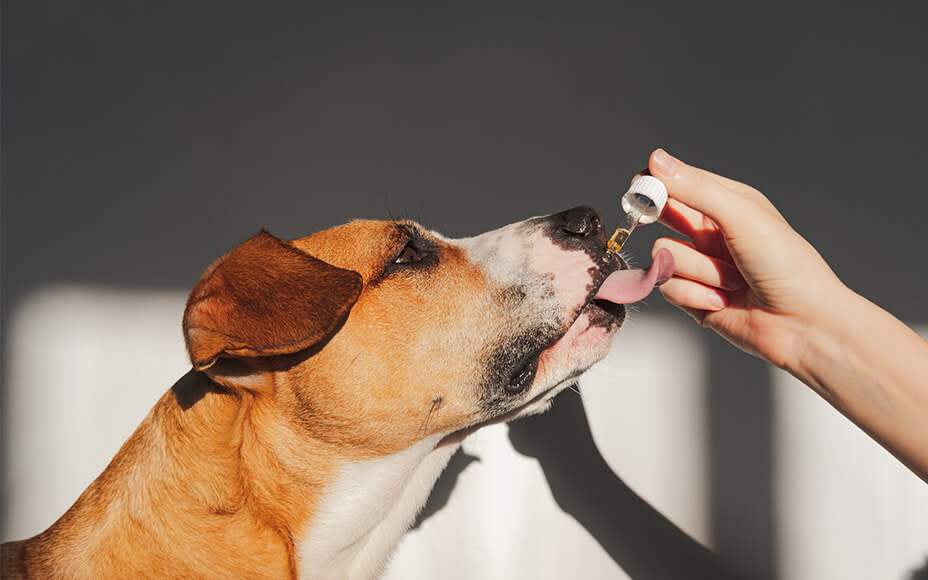Which herbs are healthy for dogs? Can I feed my dog basil or chamomile? Do herbs help dogs with pain? Learn more about the topic.
- 8 Fresh and Beneficial Herbs for Dogs
- Fennel – Calming for the Digestive System
- Sage – Good for Oral Hygiene
- Oregano – Antibacterial for Dogs
- Basil – Digestion-Promoting
- Chamomile – Anti-Inflammatory
- Parsley – Goodbye Bad Breath
- Ginseng – Nerve Strengthener
- Fenugreek – for Skin and Coat Health
- How to Best Feed Herbs to My Dog?
8 Fresh and Beneficial Herbs for Dogs
For centuries, humans have been using herbs for various purposes, from treating wounds to alleviating pain. Herbs are nature’s provided medicine. But can you actually feed herbs to a dog? Just as herbs play an essential role in human health, your dog can also benefit from the positive properties of these little green super plants.
We’ll introduce you to 8 herbs suitable for dogs and surprise you with their hidden superpowers.
Please note that in the case of a serious illness, no herb should be used as a self-healing attempt without consultation with veterinary professionals!
Fennel – Calming for the Digestive System
Fennel not only contains a high amount of vitamin C and folic acid but also other valuable nutrients. Its calming effect on the digestive tract is especially beneficial for dogs with sensitive stomachs. Growing puppies can also benefit from the powers of this vitamin-rich bulb. If you want to give fennel to your dog as a vegetable, you should either steam it or puree it well in its raw state and mix it with the food.
Bonus point:
The essential oils in fennel contribute to good oral hygiene for your dog. Due to its mucus-dissolving effect, fennel is also a real help in cases of colds.

Sage – Good for Oral Hygiene
Can dogs actually eat sage? Many owners rightfully ask this question. Sage, with its bitter compounds, stimulates intestinal functions and the gallbladder. It promotes the production of digestive juices in your dog’s stomach, helping to reduce flatulence and digest fat better. You can feed sage either dried or as a tea infusion.
Sage also benefits your dog’s gums and oral hygiene—irritated mucous membranes are soothed, and the essential oils in this green herb inhibit bacterial growth. Fresh sage for dogs means less bad breath for your four-legged friend and more smooches for you! However, proper dental cleaning cannot be replaced by chewing sage leaves.
Want more in your dog’s bowl? Enhance your furry friend’s food with our healthy and delicious supplements, adding variety and a nutritional boost to the next meal!
Oregano – Antibacterial for Dogs
For the stomach and intestinal flora, the herb that typically enhances spaghetti and pizza is a real gain. The bitter compounds it contains reliably support symptoms like diarrhea or bloating and provide relief. Oregano for dogs is an all-rounder and is popular as a home remedy for its anti-inflammatory properties, especially for conditions like arthritis and high cholesterol levels.
Basil – Digestion-Promoting
Basil, with its multitude of essential oils, has a digestion-promoting effect on your dog’s intestines. This is especially beneficial when dealing with a gassy stomach. You can feed basil to your dog either dried or fresh.
Moreover, free radicals stand no chance—these are the small culprits responsible for the development of cancer cells. Basil shines with a variety of healthy antioxidants that protect your dog’s healthy cells and eliminate radicals. Additionally, basil may be helpful in relieving pain and inflammation, such as arthritis.
Is your furry friend struggling with osteoarthritis or other joint problems? Then our WET FOOD is the perfect choice. With salmon for valuable omega-3 fatty acids, which can support both joint health and brain function.
Chamomile – Anti-Inflammatory
Chamomile, infused as tea, with its anti-inflammatory and antispasmodic properties, is particularly helpful for wounds and gastrointestinal issues. Internally, this all-rounder herb, added to tea or food, calms mucous membranes, and externally, it offers a lot: It promotes relief in cases of skin inflammation and even in the oral cavity.
Whether as a compress or wrap for affected areas, chamomile brings visible improvements within a few days. It can also bring back the shine to your dog’s hair in cases of skin allergies and coat problems.
Parsley – Goodbye Bad Breath
A gentle breeze from your furry friend, and you could faint from the rather strong odor? Parsley, in small amounts, is suitable for freshening breath. It also benefits bladder and kidney function.
Ginseng – Nerve Strengthener
Ginseng has been used as a medicinal plant for thousands of years and revered. It is also referred to as the “anti-stress root” as it is believed to increase stress resistance and nerve strength in dogs. In addition to its medically effective compounds called saponins, ginseng root also contains a high concentration of vitamins and minerals. It is usually added to food as a powder.
The contained germanium is believed to be effective against bacteria, viruses, and fungi. Ginseng also has positive effects on your dog’s health, believed to strengthen the immune system and provide new energy. It is thought to enhance concentration and heart function in your furry friend. Through the saponins it contains, ginseng stabilizes blood pressure.

Fenugreek – for Skin and Coat Health
Fenugreek is a famous medicinal plant that has even been recognized by the Federal Health Office as a remedy. The coarsely powdered fenugreek seed supports your furry friend’s blood formation, improves skin and hair function, and strengthens the immune system.
Fenugreek contains vitamins A and D, as well as the trace element phosphorus. The choline it contains is believed to counteract liver fat, positively influence metabolism, and prevent atherosclerosis. Fenugreek also has anti-inflammatory and appetite-stimulating properties.
How to Best Feed Herbs to My Dog?
There are various methods to administer our six super herbs to your furry friend. For most of them, especially during inflammation, colds, and other acute illnesses in your furry friend, you can brew a tea and feed it to your dog in small sips after it has cooled down.
If your dog thinks, “No thanks, that’s not really my taste,” you need to get a bit creative. If your furry friend rejects the herbs initially, there’s no need to worry. Many dogs are not accustomed to the taste of the essential oils contained and are often skeptical at the beginning. You can simply mix the tea with the food, not only during illness.
You can also feed the herbs finely chopped or pureed. Some of them are also available in highly concentrated powder form, but you should always discuss the administration with nutrition experts! All herbs are suitable, in moderation (here, less is more), as a daily addition to your dog’s food. And because we know how beneficial various herbs are for your furry friend, we have utilized this knowledge in developing our dog food, creating tasty complete meals that contain valuable herbs.


